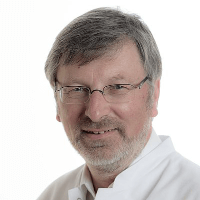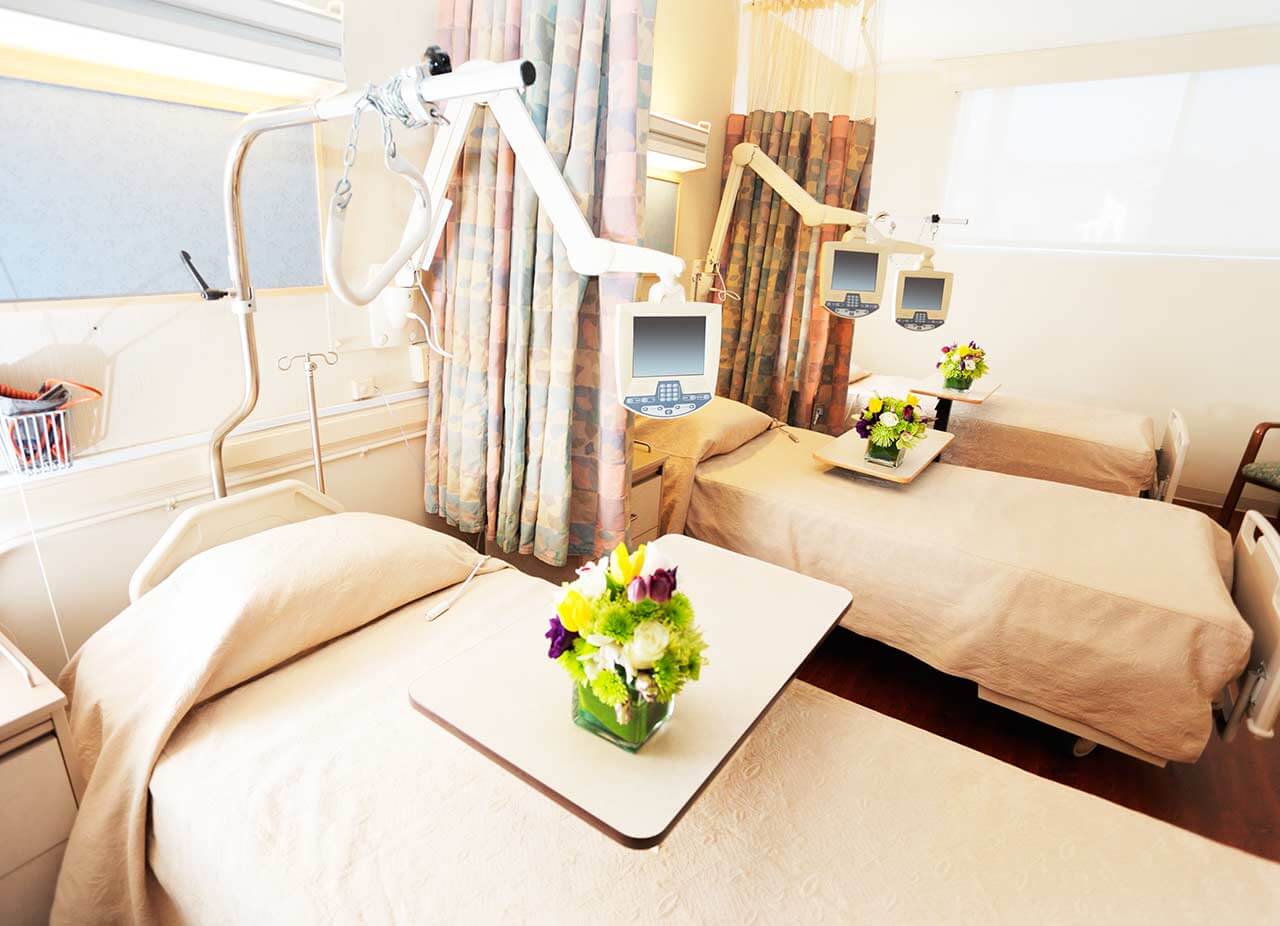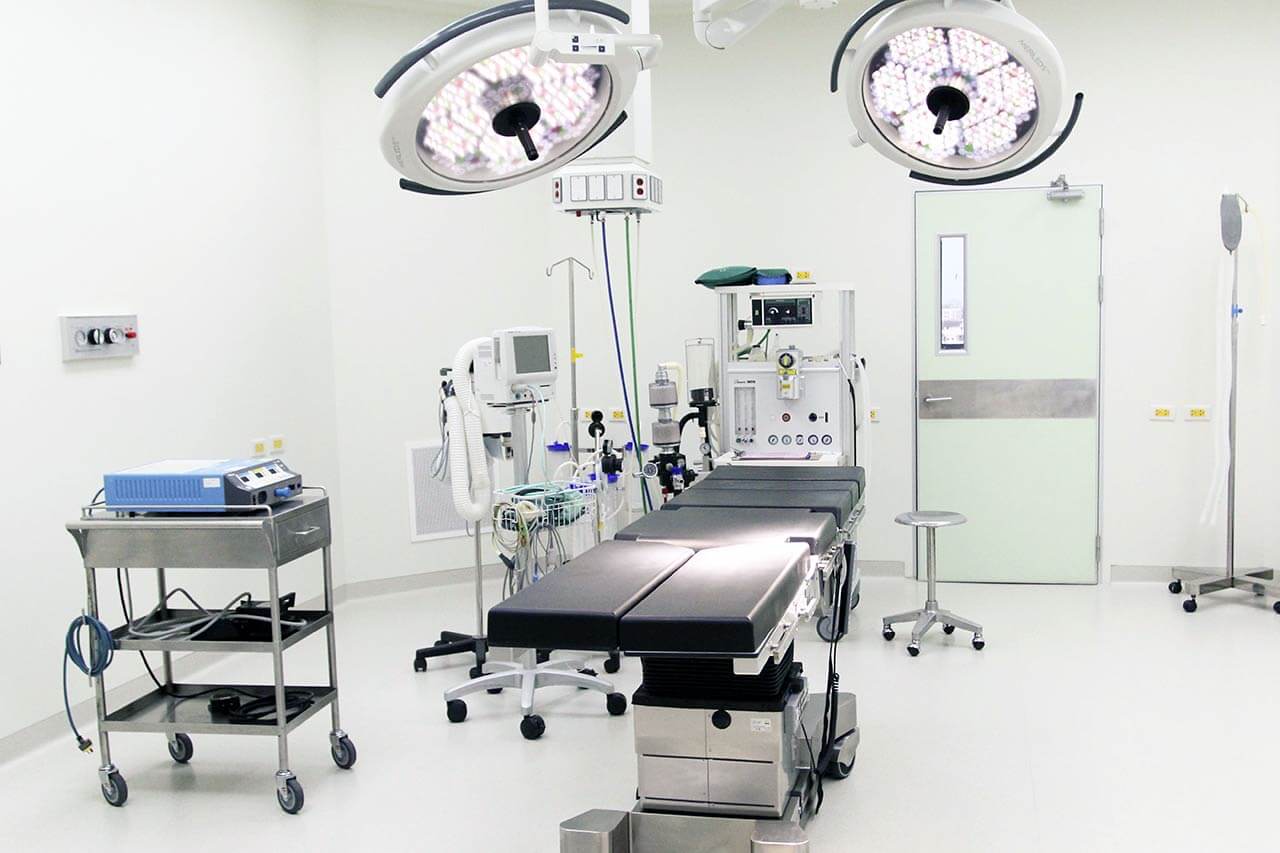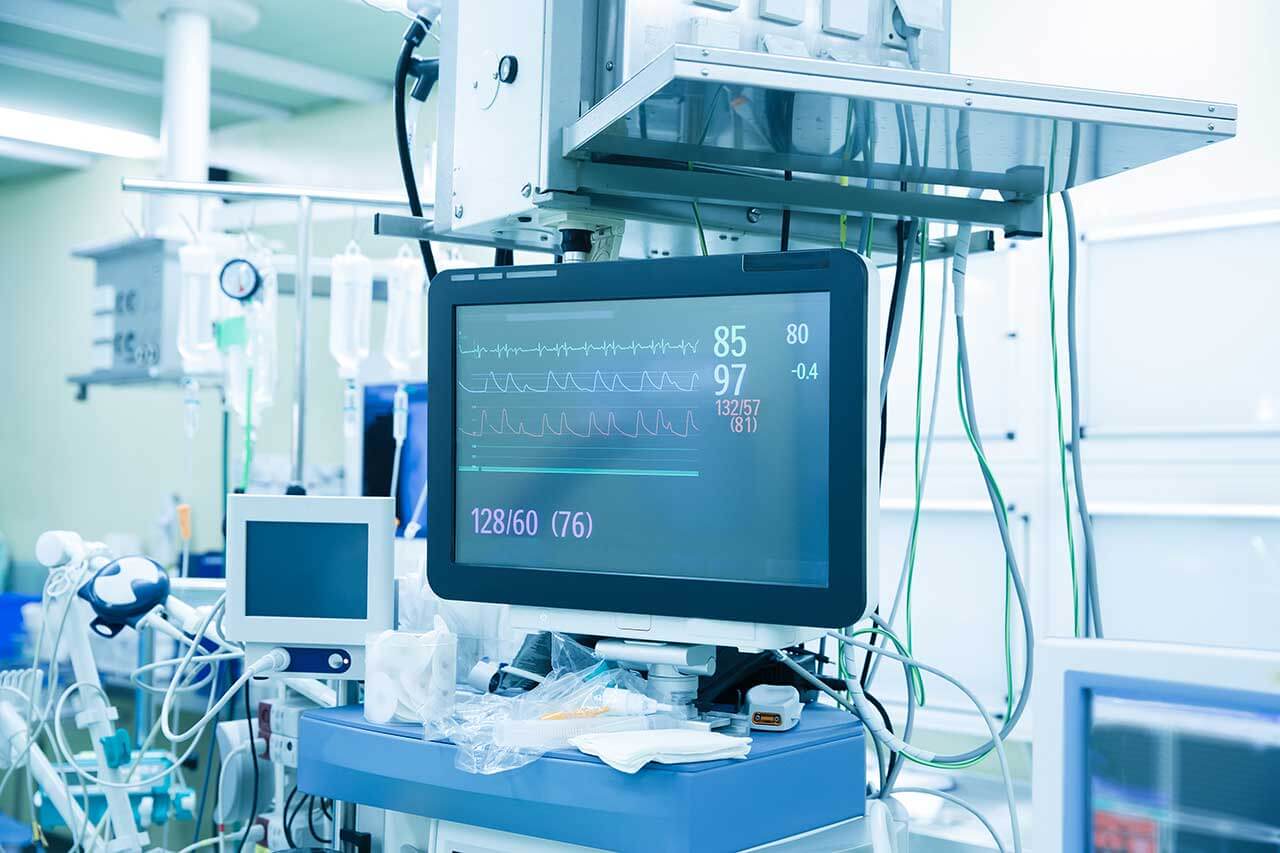
The program includes:
- Initial presentation in the clinic
- clinical history taking
- physical examination
- review of medical records
- laboratory tests:
- complete blood count
- general urine analysis
- biochemical blood analysis
- tumor markers
- indicators of inflammation
- indicators of blood coagulation
- CT/MRI
- ultrasound/ X-ray examination
- conduct endo-sonography of bronchi
- bronchoscopy with biopsy of bronchi and lungs
- histological/ cytological research
- nursing services
- consultation of related specialists
- consultation of the chief physician and all leading experts
- development of individual treatment plan
Required documents
- Medical records
- MRI/CT scan (not older than 3 months)
- Biopsy results (if available)
Service
You may also book:
 BookingHealth Price from:
BookingHealth Price from:
About the department
The Department of Pulmonology at the Hospital Kloster Grafschaft Schmallenberg offers all the options of modern medicine in the diagnostics and treatment of diseases of the lungs, bronchi and pleural cavities. The priority focuses of the department's doctors are the treatment of chronic obstructive pulmonary disease (COPD), bronchial asthma and pulmonary emphysema. Another important focus of the medical facility is on the diagnostics and treatment of chronic cough. The treatment of lung tumors is also within the competence of the department. It is provided in cooperation with the Lung Cancer Center Hemer – one of the best specialized centers in Germany certified by the German Cancer Society. The department is proud of its excellent diagnostic equipment: X-ray devices, computed tomography, equipment for bronchoscopy, spirometry, whole body plethysmography, etc. Thus, pulmonologists have all the necessary resources to make an accurate diagnosis, which determines the success of further therapeutic measures. The department's medical team annually admits more than 4,000 patients, which testifies to the high level of medical care and the reputability of the department in the area of its specialization. The department is headed by Dr. med. Peter Haidl.
The department is distinguished by successful experience in the treatment of chronic obstructive pulmonary disease (COPD). COPD is a pathology characterized by chronically restricted air movement in the respiratory system. The main symptoms of COPD are chronic cough, profuse sputum when coughing and shortness of breath. The standard diagnostic protocol includes a general clinical examination, spirometry, sputum cytology and X-ray imaging. Should the diagnosis of chronic obstructive pulmonary disease be confirmed, the patient will receive an individual treatment regimen. COPD therapy is based on the intake of such medications as bronchodilators, mucolytics, antibiotics, etc. The department's doctors also actively use inhalation therapy (the use of bronchodilators in the form of inhalation), which is one of the most effective treatment methods for COPD. The specialists often use long-term oxygen therapy, which can be supplemented by non-invasive ventilation. All the therapeutic procedures are carried out under strict medical supervision. In addition, the department's doctors strongly recommend the patients to quit smoking.
An integral part of clinical practice of the department's doctors is the treatment of chronic cough. Cough is a symptom of many pulmonary diseases (for example, influenza, bronchitis, pneumonia), so it is extremely important for the specialists to determine the exact cause of its development and to provide the required treatment. The treatment of recurrent infectious pulmonary diseases (bronchitis, pneumonia and others) is of particular interest to the department's medical team. As a rule, to treat these pathologies, the doctors use drug therapy with antibiotics.
The department's service range is complemented by comprehensive diagnostics and treatment of lung tumors. Lung cancer is one of the most dangerous types of oncology, and therefore modern treatment methods are required to fight against this disease. The department's pulmonologists treat lung cancer in cooperation with one of the best Lung Cancer Centers in Germany (Hemer). In most cases, the patients with lung cancer require surgery to resect a malignant tumor. If the tumor is detected at the early stages, it is possible to perform endoscopic procedures (therapeutic bronchoscopy). However, if the pathology has reached an advanced stage, the patient will then be indicated either minimally invasive or classical open surgery. The surgical treatment can be complemented by chemotherapy, radiation therapy and chemoradiotherapy. The patients with terminal lung cancer receive high-quality palliative care aimed at relieving symptoms and improving quality of life. As in the case of benign pulmonary diseases, the treatment regimen for lung cancer is developed for each patient individually.
The department specializes in the diagnostics and treatment of the following respiratory diseases:
- Chronic obstructive pulmonary disease (COPD)
- Pulmonary emphysema
- Bronchial asthma
- Lung tumors
- Interstitial lung disease
- Chronic cough
- Shortness of breath of unknown origin
- Pleurisy
- Diaphragmatic disorders
- Other diseases of the respiratory system
The department's range of medical services includes:
- Diagnostics
- Pulmonary function testing
- Whole body plethysmography to assess airway resistance and static lung volumes
- Spirometry to assess volumetric and velocity parameters of breathing
- Measurement of the diffusion capacity of the lungs (single breath method)
- Capillary blood test (at rest and stress) to assess pulmonary gas exchange
- Bronchospasmolysis test to assess the reversibility of airway obstruction
- Non-specific bronchial provocation test with histamine to detect bronchial hyperresponsiveness
- Measurement of respiratory muscle strength (P01, Pimax) to detect impairments of their pumping function
- Diagnostics of impaired mucociliary clearance
- Six-minute walk test
- Spiroergometry
- Capnometry during sleep to assess the concentration or partial pressure of carbon dioxide in the inhaled and exhaled air during the patient's breathing cycle
- Electrocardiography
- 24-hour blood pressure monitoring
- Diagnostic flexible and rigid bronchoscopy
- Diagnostic bronchoalveolar lavage
- X-ray-guided transbronchial lung biopsy
- Endobronchial ultrasound (EBUS)
- Endobronchial ultrasound-guided transbronchial needle aspiration (EBUS-TBNA)
- Diagnostic pleural puncture
- Ultrasound and CT-guided transthoracic needle biopsy
- Diagnostic thoracoscopy
- Diaphragm X-ray scanning
- Gastroscopy
- Rectoscopy and colonoscopy
- Transesophageal echocardiography
- Pulmonary function testing
- Treatment
- Drug therapy
- Inhalation therapy
- Long-term oxygen therapy
- Therapeutic flexible and rigid bronchoscopy
- Therapeutic bronchoalveolar lavage
- Argon plasma coagulation
- Therapeutic pleural puncture
- Pleural drainage
- Therapeutic thoracoscopy
- Pleurodesis
- Other diagnostic and therapeutic options
Curriculum vitae
Higher Education and Professional Career
- 1976 - 1982 Study of Human Medicine at Ludwig Maximilian University of Munich.
- 01.1983 - 05.1984 Compulsory military service as a Military Doctor.
- 04.1984 Doctoral thesis defense, Department of Internal Medicine II, University Hospital Grosshadern. Subject: "Clinical significance of beta hCG in patients with testicular germ cell tumours".
- 07.1984 - 01.1991 Assistant Physician, Departments of Surgery and Internal Medicine, Hospitals in Lindenberg and Kempten.
- 09.1991 Board Certification in Internal Medicine.
- 02.1991 - 09.1993 Advanced training in Pulmonology and Allergology, Lung Hospital Wangen im Allgäu.
- 05.1993 Specialization in Pulmonology.
- 10.1993 Senior Physician in the Department of Pulmonology and Somnology at the Hospital Kloster Grafschaft Schmallenberg.
- 01.2003 Senior Physician and Deputy Head of the Department of Pulmonology, Respiratory Medicine and Somnology at the Hospital Kloster Grafschaft Schmallenberg.
- Since 09.2007 Chief Physician of the Department of Pulmonology at the Hospital Kloster Grafschaft Schmallenberg.
- Since 01.07.2013 Medical Director of the Hospital Kloster Grafschaft Schmallenberg.
Qualifications
- General intensive care.
- Allergology.
- Drug tumor therapy.
- Theoretical basis of the use of radioactive substances.
Authorized to Conduct Advanced Training Courses
- Internal medicine and pulmonology.
- Chest X-ray.
Research Interests
- Pharmacological influence on mucociliary clearance.
- Clinical problems of inhalation therapy.
- Use of aerosols in medicine.
- Non-invasive ventilation.
Memberships in Professional Societies
- International Society for Aerosols in Medicine.
- European Respiratory Society.
- Section for Pathophysiology and Pharmaceutical Aerosols of the German Respiratory Society.
- Examiner of the Medical Association of Westphalia-Lippe.
- Section for Internal Medicine and Pulmonology of the Academy for Medical Training of the Medical Association of Westphalia-Lippe (Board Member).
Photo of the doctor: (c) Fachkrankenhauses Kloster Grafschaft
About hospital
The Hospital Kloster Grafschaft Schmallenberg is a leading medical facility, which provides both diagnostics and treatment of the full range of respiratory diseases. The hospital's key focuses include the treatment of diseases of the lungs and other respiratory organs, allergies, sleep-related breathing disorders, as well as the weaning of patients from mechanical ventilation.
The history of the hospital dates back to 1950. At that time, it had the status of a sanatorium for the patients with sarcoidosis. Over time, a new building was erected. There were opened the Departments of Pulmonology, Allergology, Sleep Medicine and others. Since April 2012, the medical facility has been an Academic Hospital of the Philipps University of Marburg, which provides access to innovative treatment methods. Today, the hospital is the largest highly specialized Weaning Center in Germany.
The hospital has 200 beds. The medical facility is distinguished by an excellent technical base, while the treatment is based on the use of modern therapeutic methods, the effectiveness of which has been confirmed by evidence-based medicine. It is noteworthy that the hospital has a helipad, thanks to which patients in critical condition can be freely delivered here.
The hospital annually provides treatment to about 7,000 inpatients and to more than 16,000 outpatients. Many patients with pulmonary diseases come from foreign countries, since the hospital enjoys a reputation as one of the best highly specialized centers of this kind in Germany. The patients' health is in the safe hands of a highly qualified team consisting of more than 480 employees. The doctors and nursing staff regularly attend advanced training courses to keep pace with medical innovations. During the treatment, the specialists strive to create maximum comfort and a pleasant atmosphere for each patient.
The exceptional quality of medical services in the hospital is confirmed by prestigious certificates, including DIN EN ISO 9001:2015 certificate, LGA InterCert certificate, WIESO CERT certificate, DAkkS certificate and others.
Photo: (с) depositphotos
Accommodation in hospital
Patients rooms
The patients of the Hospital Kloster Grafschaft Schmallenberg live in cozy single and double rooms equipped with everything necessary for a comfortable hospital stay. The standard room furnishings include an automatically adjustable bed, a bedside table with a pull-out tray, a wardrobe, a TV and a telephone. Wi-Fi access is also available in each patient room. The rooms have an ensuite bathroom with shower and toilet.
If desired, patients can live in enhanced-comfort rooms with a more refined design, upholstered furniture, a safe for storing valuables and a mini fridge.
Smoking is prohibited in the hospital. The patients can smoke only in a specially equipped glass pavilion located on the right side of the main entrance.
Meals and Menus
The patient and the accompanying person are offered a tasty and balanced three meals a day: breakfast, lunch and dinner. If for some reason you do not eat all the foods, you will be offered an individual menu. Please inform the medical staff about your dietary preferences prior to treatment.
There is also a cafeteria on the ground floor of the hospital, which offers a wide range of salads, snacks, sweets, pastries, ice cream, hot and cold drinks. The cafeteria also sells fresh newspapers and magazines, toiletries.
Further details
Standard rooms include:
Religion
The religious services are available upon request.
Accompanying person
During the inpatient program, the accompanying person can stay with the patient in a patient room or at a hotel of his choice. Our managers will help you choose the most suitable option.
Hotel
During the outpatient program, the patient can stay at a hotel of his choice. Our managers will help you choose the most suitable option.




